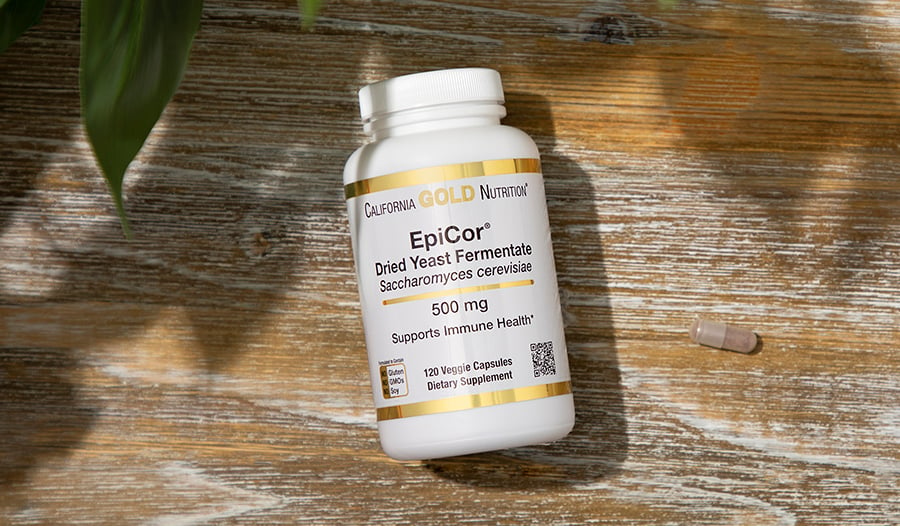Epicor—The Power of Fermentation and Immune Benefits

EpiCor postbiotic is a scientifically formulated fermentate made using baker’s yeast (Saccharomyces cerevisiae). Research, including eight human clinical trials, suggests that EpiCor offers potent benefits for the gut and immune systems. You can find EpiCor in many immune-supporting combination supplements or as a single ingredient.
What Is a Postbiotic?
You’ve probably heard of probiotics and prebiotics and their vast array of health benefits. As a quick refresher, probiotics are live microorganisms found in fermented foods like yogurt, kefir, and kombucha, as well as in supplement form. Research shows probiotics may help regulate digestion, improve immune function, and offer other potential health benefits.
Prebiotics feed our gut bugs. Our bodies can’t digest the prebiotic fiber we eat. Instead, prebiotics serve as food for the friendly bacteria in our guts, improving the gut microbiome’s composition and function.
So, what are postbiotics? Postbiotics are nonliving metabolites, like short-chain fatty acids, antioxidants, polyphenols, proteins, vitamins, and minerals, produced by our gut microorganisms. They are byproducts of the fermentation of prebiotics in our digestive system. They can also be made outside the body through fermentation processes carried out by bacteria, yeast, and fungi.
Research suggests many postbiotics benefit the gut microbiome and immune system. Postbiotics are nonliving compounds, so they can serve an important role in healing the gut, improving the gut microbiome, and supporting the immune systems of people who are unable or prefer not to take live probiotics for any reason. Supplementing with a postbiotic like EpiCor can be a great way to deliver these health-promoting metabolites directly to the gut.
The Power of Fermentation
Fermentation is a chemical process that happens both inside our bodies—like in lactic acid fermentation during a hard workout—and outside of our bodies—such as when fermenting tea to make kombucha. Humans have used fermentation for thousands of years to increase the shelf life of foods and beverages, to reap the health benefits of fermented foods, and because fermented foods are pretty tasty.
The health benefits of fermentation vary based on what food is fermented. For example, dairy, grains, and vegetables are all commonly fermented foods, and each carries its own unique flavor characteristics and health benefits.
For fermentation to occur, you need a substrate (the food or beverage that will be fermented), microorganisms (bacteria, yeast, or fungi), and an ideal environment for chemical changes. Under the right conditions, the microorganisms react with the substrate over time, creating a fermented product with higher nutritional content. For example, fermented tea contains more antioxidants and polyphenols than unfermented tea.
However, not everyone has the time or interest to ferment foods at home. Luckily, EpiCor does the fermentation for you, so you can reap the benefits. Through EpiCor’s fermentation and drying process, live Saccharomyces cerevisiae are transformed from active yeast to inactive yeast plus beneficial byproducts.
EpiCor’s process involves growing the yeast in anaerobic—meaning without oxygen—conditions, which creates an environment in which the important metabolites can be formed. The whole product is then dried, deactivating the yeast, and ground into a powder for packaging. Because nothing is added or subtracted from the mix, EpiCor is considered a whole food fermentate.
Immune Health Benefits of Epicor
You're in good company if you’re looking for ways to support your immune system. With so many options for immune support, it can be hard to sift through the information to understand which products to take when, in what dosages, and combinations.
EpiCor makes it easy with its combination of immune essentials like short-chain fatty acids, B vitamins, minerals, polyphenols like resveratrol, and antioxidants that work synergistically to improve immune function. These compounds affect the intestinal epithelium and our gut immune cells.
For example, folate (vitamin B9) is essential for maintaining T-regulatory cells—the cells that help control our immune system’s responses and help prevent autoimmunity—in the intestine. Vitamin B6, or pyridoxine, is essential for cell growth and maintaining healthy numbers of lymphocytes.
Multiple research studies have evaluated EpiCor’s immune-supportive qualities. One double-blind, placebo-controlled, randomized pilot study from 2008 found that EpiCor benefits red blood cell and mucosal immune health. Specifically, EpiCor stimulated:
- B-lymphocytes: part of the adaptive (or acquired) immune system and responsible for recognizing invaders and creating antibodies
- Salivary Secretory IgA: an antibody that helps protect mucosal membranes from foreign invaders
- Natural Killer Cells: part of the innate immune system, they do precisely what their name suggests—kill cells infected with viruses
Cold and Flu Support
Two randomized, double-blind, placebo-controlled trials in 2008 and 2010 showed that EpiCor might help reduce the incidence of cold and flu-like symptoms. Researchers evaluated the effects of EpiCor versus placebo in both studies.
In the 2008 study, 116 participants were vaccinated against influenza shortly before the trial, then were given either EpiCor or a placebo for 12 weeks. Participants who took EpiCor had fewer cold and flu-like symptoms and shorter duration of symptoms as measured by blood tests, in-clinic exams, and self-reported symptom diaries, compared to those who took a placebo.
The 2010 study involved 116 participants with no history of influenza vaccine in the 12 months before enrolling in the study. Participants took either 500 mg of EpiCor or a placebo daily. Again, results showed a significant reduction in cold and flu-like symptoms in those who took EpiCor compared to those who took a placebo. Participants taking EpiCor also experienced a nonsignificant reduction in the duration of symptoms. EpiCor was found to be safe and even had beneficial effects on blood pressure measurements.
EpiCor may be helpful during cold and flu season because of its safety profile and potential to reduce the incidence and duration of cold and flu-like symptoms.
Gut Health Benefits of Epicor
Your gut is a key player in your overall immune health. So Epicor‘s powerful immune-supporting qualities go hand-in-hand with its gut health benefits. How does EpiCor improve gut health? Prebiotics and probiotics improve gut health through the byproducts formed when probiotics “eat” prebiotics. Enter EpiCor. EpiCor is the byproducts.
Increased Butyrate Production
One byproduct that is especially helpful for gut health is butyrate. Butyrate is a short-chain fatty acid formed when friendly gut bacteria digest the fiber you eat. Butyrate is the primary energy source for your colon cells. It helps to improve gut mucosal health and supports intestinal barrier function. Butyrate also plays a role in intestinal motility, contributes to immune regulation, and has anti-inflammatory effects.
One 2019 study analyzed intestinal barrier integrity in rats exposed to heat-stress conditions. Two groups of rats were given either Saccharomyces cerevisiae fermentate or a saline solution for 14 days. Half of the rats in each group were then exposed to heat stress.
The study found that the Saccharomyces cerevisiae fermentate helped preserve intestinal barrier function and improve microbial makeup in heat-stress conditions. The study authors attributed this improved gut protection to increased butyrate production in the large intestines of rats who took the fermentate.
Results from this study are consistent with others that show that EpiCor induces butyrate production in the gut. This is important because when intestinal permeability is compromised—like with leaky gut—you can experience symptoms like constipation, diarrhea, skin issues, joint pain, and more. EpiCor could play a role in healing gut tissue.
Improved Gut Symptoms
EpiCor may improve intestinal barrier function and microbial composition, but what does that mean for gut symptoms? Research suggests Epicor may help relieve constipation and gut discomfort.
One 2017 randomized, double-blind, placebo-controlled pilot trial examined the effects of EpiCor on constipation and gut discomfort. Eighty adults with gastrointestinal discomfort and constipation were given either 500mg of EpiCor or a placebo for six weeks. Participants who took EpiCor had less bloating and fullness and improved stool consistency and frequency as measured by fecal samples and a self-reported diary compared to those who took a placebo.
The study also found that participants who took EpiCor experienced a beneficial shift in their gut microbiota. Participants with severe symptoms before taking EpiCor had increased numbers of gut bacteria from families Bacteroidaceae and Prevotellaceae after the intervention. Low numbers of these bacteria are associated with symptoms of constipation. Participants with moderate symptoms had increased numbers of Akkermansia muciniphila after taking EpiCor.
Results from this study suggest EpiCor helps support gut health by improving the composition of intestinal flora through increased diversity and numbers of beneficial bacteria. This gut microbial shift may help decrease uncomfortable digestive symptoms and increase intestinal motility.
Takeaway
The health and diversity of your gut microbiome are integral to proper immune function. So, in caring for your gut health, you are caring for the health of your entire body.
Postbiotics are the byproducts formed when friendly gut bacteria digest the dietary fiber or prebiotics, you eat. But you can deliver postbiotics directly to your gut in supplement form with EpiCor.
As we head into cold and flu season this year, Epicor may be a great option to add additional immune support to your daily supplement routine. EpiCor may also help support the health of your gut lining and improve digestive symptoms like constipation and bloating. Clinical trials suggest a daily 500mg dose of Epicor provided benefits.
As always, talk with your physician or qualified healthcare provider before beginning any new supplement to be sure it is safe for you and won’t interact with any medications you are taking.
References:
- What Is EpiCor? - EpiCor Postbiotic Immune. Accessed November 21, 2022.
- Hill, C., Guarner, F., Reid, G. et al. The International Scientific Association for Probiotics and Prebiotics consensus statement on the scope and appropriate use of the term probiotic. Nat Rev Gastroenterol Hepatol 11, 506–514 (2014).
- Hannah D. Holscher. Dietary fiber and prebiotics and the gastrointestinal microbiota, Gut Microbes. 8:2, 172-184 (2017).
- Żółkiewicz J, Marzec A, Ruszczyński M, Feleszko W. Postbiotics—A Step Beyond Pre- and Probiotics. Nutrients. 2020; 12(8):2189.
- Melini, F., Melini, V., Luziatelli, F., Ficca, A. G., & Ruzzi, M. (2019). Health-Promoting Components in Fermented Foods: An Up-to-Date Systematic Review. Nutrients, 11(5), 1189.
- Moyad, M. A., Robinson, L. E., Zawada, E. T., Kittelsrud, J., Chen, D. G., Reeves, S. G., & Weaver, S. (2010). Immunogenic yeast-based fermentate for cold/flu-like symptoms in nonvaccinated individuals. Journal of alternative and complementary medicine (New York, N.Y.), 16(2), 213–218.
- (7)Jensen, G. S., Patterson, K. M., Barnes, J., Schauss, A. G., Beaman, R., Reeves, S. G., & Robinson, L. E. (2008). A double-blind placebo-controlled, randomized pilot study: Consumption of a high-metabolite immunogen from yeast culture has beneficial effects on erythrocyte health and mucosal immune protection in healthy subjects. The Open Nutrition Journal, 2(1), 68–75.
- Althuwaiqeb SA, Bordoni B. Histology, B cell lymphocyte. National Center for Biotechnology Information. Retrieved November 18, 2022
- Vivier, E., Tomasello, E., Baratin, M. et al. Functions of natural killer cells. Nat Immunol 9, 503–510 (2008).
- de Sousa-Pereira, P., & Woof, J. M. (2019). IgA: Structure, Function, and Developability. Antibodies (Basel, Switzerland), 8(4), 57.
- Kunisawa, J., & Kiyono, H. (2013). Vitamin-mediated regulation of intestinal immunity. Frontiers in immunology, 4, 189.
- Moyad, M. A., Robinson, L. E., Zawada, E. T., Jr, Kittelsrud, J. M., Chen, D. G., Reeves, S. G., & Weaver, S. E. (2008). Effects of a modified yeast supplement on cold/flu symptoms. Urologic nursing, 28(1), 50–55.
- Canani, R. B., Costanzo, M. D., Leone, L., Pedata, M., Meli, R., & Calignano, A. (2011). Potential beneficial effects of butyrate in intestinal and extraintestinal diseases. World journal of gastroenterology, 17(12), 1519–1528.
- Ducray, H. A. G., Globa, L., Pustovyy, O., Morrison, E., Vodyanoy, V., & Sorokulova, I. (2019). Yeast fermentate prebiotic improves intestinal barrier integrity during heat stress by modulation of the gut microbiota in rats. Journal of applied microbiology, 127(4), 1192–1206.
- Pinheiro, I., Robinson, L., Verhelst, A., Marzorati, M., Winkens, B., den Abbeele, P. V., & Possemiers, S. (2017). A yeast fermentate improves gastrointestinal discomfort and constipation by modulation of the gut microbiome: results from a randomized double-blind placebo-controlled pilot trial. BMC complementary and alternative medicine, 17(1), 441.
DISCLAIMER:This Wellness Hub does not intend to provide diagnosis...
















































































 Table of Contents
Table of Contents
















